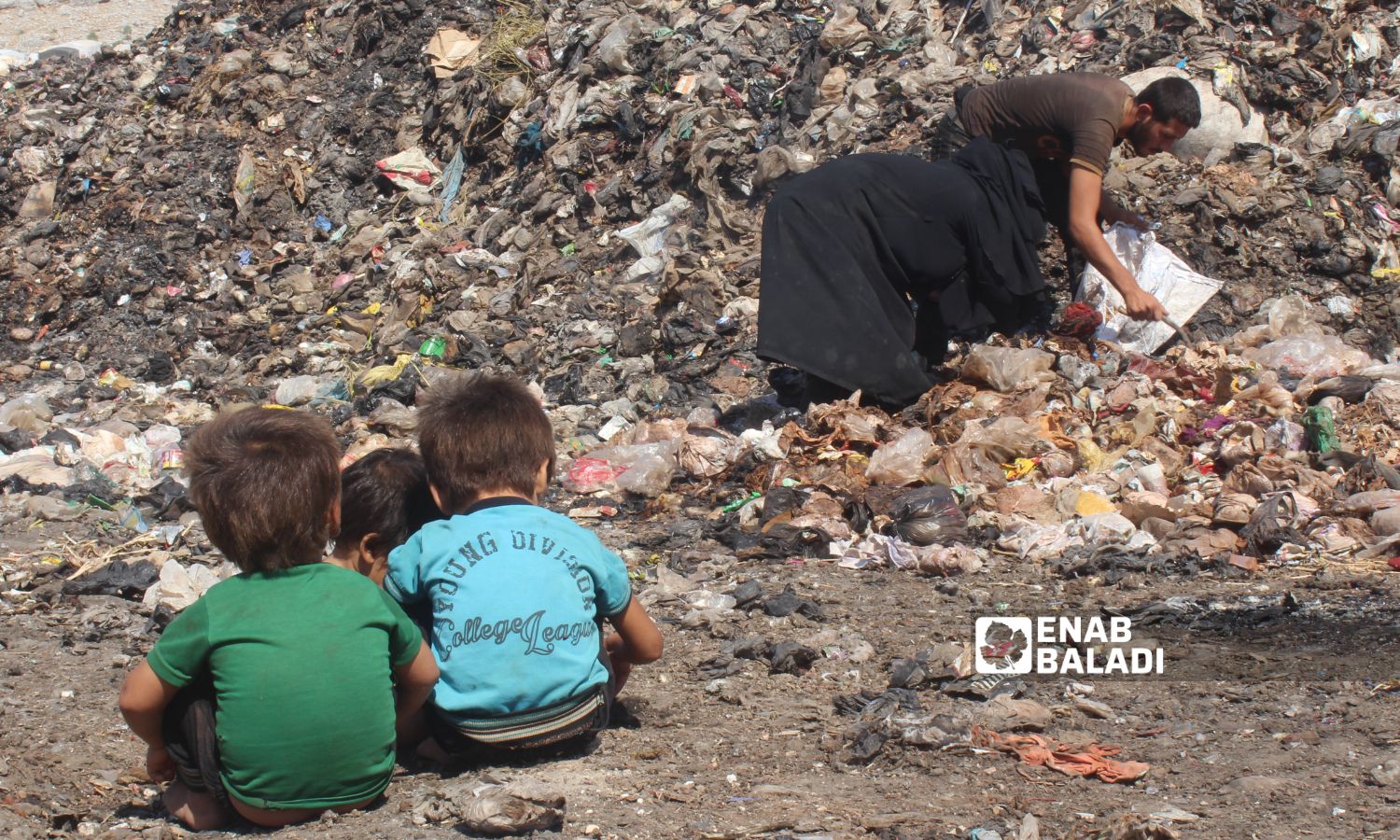



Idlib – Huda al-Kulaib
Many women who are the breadwinners of their families engage in stressful and dangerous professions, with high unemployment rates in northwestern Syria and the lack of job opportunities, in order to secure their basic needs, especially with the onset of winter, amid high prices and low wages.
Some women, especially those residing in IDP camps throughout Idlib governorate, resort to work that is known locally as the specialty of men or an activity fraught with danger, with the spread of unexploded ordnance and remnants of war.
While the local community considers women’s work, especially in rough professions, to be uncommon, according to civilians interviewed by Enab Baladi in Idlib countryside, it has become less strange today in light of the difficult conditions that some families suffer from.
Over the years of the Syrian war, the features of cities and villages have changed in the northern governorate of Idlib and parts of the countryside of Aleppo, where the Turkish-backed Syrian opposition factions are stationed, along with millions of displaced civilians from other cities in southern and central Syria, as a result of the bombing originating from Russia and the Syrian regime forces, the intensity of which varies between now and then.
While UN and international organizations have warned of the dangers of the remnants of war on the lives of civilians, some women who live in the Syrian displacement camps resorted to searching for these remnants to benefit from their minerals, which constitute a source of income for some of them.
Karima al-Ahmad, 30, says that after years of working as a garbage collector, she has many skin and respiratory diseases, not to mention the other risks this profession carries.
Al-Ahmad told Enab Baladi that she witnessed the injury of a number of children working with her in collecting waste in the garbage dump in the town of Killi, northwest of Idlib when a cluster bomb exploded as a result of a previous bombing of the area.
She added that she has been working in waste collection since she was displaced from her village, south of Maarat al-Numan, during the military operations in 2020 and settled near Killi. She was forced to work in this profession despite its disadvantages as a result of the deteriorating living and economic conditions.
In a report issued in December 2022, the Syria Civil Defense (SCD) team documented 32 explosions of remnants of war, including landmines and unexploded ordnance, in northwestern Syria, during 2022 alone.
The remnants of war are widely spread throughout northwestern Syria, and they abound in the al-Ghab Plain region, near the city of Jisr al-Shughour, the eastern regions of Idlib (Including towns of Sarmin, Binnish, and Taftanaz), south of Idlib in Jabal al-Zawiya, the western countryside of Aleppo, and the al-Bab and Afrin regions in the Aleppo countryside.
While she was working in collecting agricultural crops far from her camp of Tal al-Karama north of Idlib, Sabria Haj Hassan, 34, was involved in a painful traffic accident that fractured her right foot more than a month ago as she is still suffering from its consequences until today.
“A morsel dipped in blood,” Haj Hassan described her work to Enab Baladi, “referring to the dangers and difficulties she faces in her life after she was displaced with her husband and five children from her town, Hazarin, south of Idlib.
Sabria’s husband is unemployed today and finds it very difficult to find a source of income in an area where the most basic necessities of life are not available.
She returned to her work weeks after the traffic accident, which she was subjected to, accompanied by other women, and while they were on their way to the workplace to harvest the potato crop on the outskirts of the town of Salqin, the van overturned due to the roughness of the road. The accident resulted in the death of a number of women and the injury of others, she said.
The fate of workers in the field of harvesting crops in Idlib governorate is linked to many obstacles and dangers, most notably the bombardment of the southern countryside of Idlib by the Syrian regime forces and Russian air forces on an ongoing basis, targeting agricultural areas and fields.
The bombing resulted in the killing of male and female workers at different times, while the shelling continues almost daily in the same area.
Harvesting crops from agricultural lands in these areas is accompanied by instructions and warnings from local organizations about the need to be careful and watch out for any foreign object in the land that is remnants of war.
Local observatories specialized in monitoring military movements also issue warnings and directives in the event of military aircraft taking off or the start of artillery shelling by the regime forces toward the opposition-held areas.
The circumstances of the war have imposed complex economic responsibilities on Syrian women, with the absence of the traditional breadwinner and a large part of them turning to physical disability in most cases, especially in the northwestern regions outside the control of the regime, the Women’s International League for Peace and Freedom said.
The WILPF report on “Women in the Syrian Economy,” issued in March 2021, stated that the poor economic conditions forced women to work in a manner unfamiliar to the traditional Syrian society, with the aim of securing the necessities of life under extremely harsh conditions.
if you think the article contain wrong information or you have additional details Send Correction